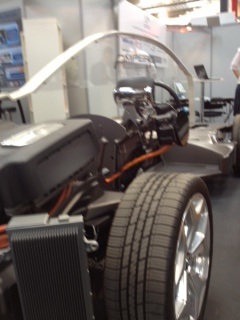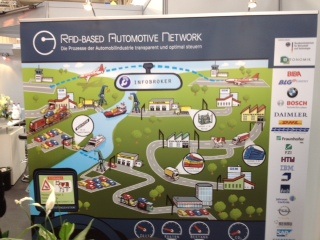More From CeBIT: RFID-Based Automotive Network (RAN)
 More than 18 European companies have formed a consortium to leverage the power of RFID to fully optimize the automotive industry’s production and delivery systems. The RFID-Based Automotive Network (RAN) initiative’s goal is to create an integrated system that provides uninterrupted transparency during the manufacturing process, throughout the shipping route, and onto the showroom floor.
More than 18 European companies have formed a consortium to leverage the power of RFID to fully optimize the automotive industry’s production and delivery systems. The RFID-Based Automotive Network (RAN) initiative’s goal is to create an integrated system that provides uninterrupted transparency during the manufacturing process, throughout the shipping route, and onto the showroom floor.
Business process experts, manufacturing engineers, and logistics teams are utilizing RFID technology at every opportunity to bring RAN to life. Representatives at CeBIT 2012 in Hannover, Germany, were on hand to explain the details of RAN.
A car manufactured by Opel, for example might utilize up to 70 RFID chips during the manufacturing process. RFID chips are attached to engine parts, chassis, and body parts. Different types of chips are used depending on heat tolerance, size, and placement requirements. At the dealership, dealers will be able to better manage inventory and handle inter-dealer transfers.
The RAN initiative does not extend beyond the sale to the eventual customer, but representatives state that RFID chips would serve many useful purposes during car ownership as well. While obvious uses might include recalls and maintenance schedules, the ability of RFID to store information offers solutions on the road as well. After an accident, rescue crews often need to open the vehicle as quickly as possible. An RFID chip could contain specific information that explained the car’s door structure, eliminating guesswork so the EMTs could save precious minutes during a rescue.
during car ownership as well. While obvious uses might include recalls and maintenance schedules, the ability of RFID to store information offers solutions on the road as well. After an accident, rescue crews often need to open the vehicle as quickly as possible. An RFID chip could contain specific information that explained the car’s door structure, eliminating guesswork so the EMTs could save precious minutes during a rescue.
German auto giants involved in the initiative include Daimler, BMW, and Opel. IBM, Siemens, IBS, EuroLog, and SAP provide the software and IT support. Research partners include BIBA, FZI, Fraunhofer, HTW, and IWB. For logistics, RAN relies on both BLG Logistics and DHL. Bosch, KEIPER, and REHAU join forces for distribution and delivery.
The overall goal of RAN is to give auto manufacturers and everyone else in the supply chain the ability to track auto parts and completed autos at any point in time. The hope is that this will drive cost efficiencies throughout the system. RAN also hopes to develop new manufacturing and delivery standards driven by their RFID-based network.
You can learn more about this initiative at www.autoran.de. Click on the British flag for the English version of the site.
About CeBIT 2012
"CeBIT is the world's largest trade fair showcasing digital IT and telecommunications solutions for home and work environments. The key target groups are users from industry, the wholesale/retail sector, skilled trades, banks, the services sector, government agencies, science and all users passionate about technology. CeBIT offers an international platform for comparing notes on current industry trends, networking, and product presentations.” Learn more at the CeBit 2012 website.
About the AuthorEric Moody covers barcode and POS industry events worldwide, with a particular eye toward new product development and user experience. A graduate of Brown University and Thunderbird School of Global Management, he was formerly editor of Business Digest magazine. He has been active in the retail systems world for more than 20 years.
CeBIT 2012: RFID to the Rescue
{jcomments on}
